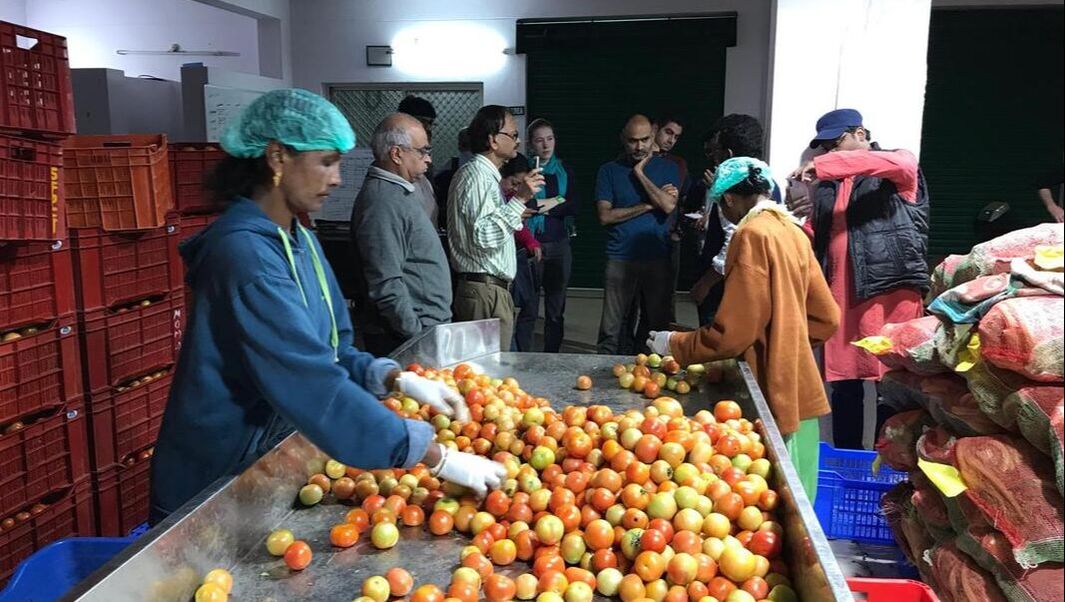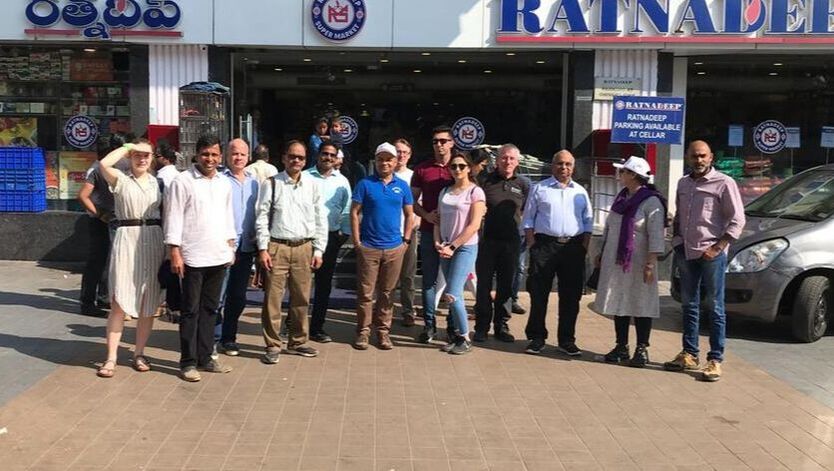|
The STFC Food Network+ (SFN) has helped launch a visionary project which aims to use systems analysis, digital platforms and space technologies to revolutionise agri-food supply chains in India. The moment a crop is harvested, it begins to spoil. This isn’t too much of a problem in modern systems where they are quickly whisked to consumers, arriving fresh and intact. But in developing nations lacking such infrastructure, huge quantities of perishable food are lost between farmers and consumers. For these regions, simply producing more food won’t help solve food insecurity unless these supply chain issues are fixed. Food loss occurs for a variety of reasons, including lack of cold storage, poor road networks and challenging climates. Developing communities are also typically made up of isolated pockets of farmers that are poorly connected to the rest of the supply chain, making it difficult to match supply with demand. With so many interconnected factors and problems, it is challenging to identify where effective interventions can be introduced. This is the aim of TRAnsforming Cold Food Chains in INdia through Space ScIence and TechNologies (TRANSSITioN). Using a systems-wide approach, this will identify relevant cutting-edge and indigenous technologies for digitising agriculture production, connecting farmers to supply chains, reducing food loss and managing food surplus. The project is a collaboration involving the University of Sheffield, the Science and Technology Facilities Council (STFC) and a range of partners from industry, NGOs, logistics providers and farming organisations. The SFN played a crucial role in the project’s launch by funding the pilot phase through a Scoping Grant. This involved a stakeholder workshop in India which brought together farmers, producers, distributors and retailers to discuss the key problems affecting their industries. Based on these discussions, the team successfully secured funding for a full-scale project proposal from the UK Government’s Global Challenge Research Fund and the STFC. The different work packages include: Identifying key leverage points for change: Using food systems concepts and methods, this will determine the obstacles, risks and opportunities for supply chain transformation in India. This will be coupled with life cycle analysis (LCA) to understand the wider impacts of possible interventions, including energy, carbon emissions, water and toxins. Digitising agriculture and connecting farmers: This will investigate the most effective digital platforms to connect farmers to supply chains. In addition, it will explore how Internet of Things (IoT) technologies and remote sensors can link farmers to data (such as soil health, local weather and crop diseases) that can help them increase productivity, farm more sustainably and be more climate resilient. Reducing losses and maximising value: Drawing on expertise from STFC’s RAL Space facility, this will investigate how existing, indigenous methods can be integrated with advanced capabilities (including space technologies such as cryogenics and thermal modelling) to increase the shelf life of fresh produce. It will also investigate new materials and methods for improving thermal insulation on farm, during transportation and storage. New business models and policies to support rural livelihoods: This will engage stakeholders and communities to co-design new public-private partnerships and funding models, including microfinance. The need for a holistic approach
“There is a clear opportunity to have a big impact on reducing agri-food loss throughout supply chains in India. But any changes have to work in the context of the existing system, be economically feasible and not harm farmers or the environment. That’s why we are using a holistic approach, rather than looking at things in isolation” says Seyed M. Ebrahimi (University of Sheffield). With a diverse background covering supply chain management, LCA, finance, banking, and computer software, Seyed seems aptly qualified for such a multidisciplinary challenge. So far, he has been involved with helping to map different end-to-end supply chain configurations for tomato and mint, which has involved visiting around 50 different farms across southern India. He is now combining this with data from the pilot workshop into a complete LCA and socio-economic evaluation of proposed interventions. Such extensive mapping work is crucial to avoid unintended consequences, and can also lead to counterintuitive findings as Seyed explains. “A key contributor to tomato spoilage is fluctuations in temperature. Our preliminary data suggest that if tomato crops are only put in cold storage at the end of the chain at the retailer, it may actually be worse than not using cold storage at all.” Ultimately, TRANSSITioN aims to introduce economically feasible technologies that enable cold storage throughout the chain, whilst meeting social and environmental priorities. Yet this work has identified other changes that could be made more quickly, such as on-farm grading technologies that reduce handling at downstream distribution centres, prolonging product life. The power of partnerships Linking up small scale farmers – many of whom still rely on handwritten notes – with the latest technologies won’t be easy, but TRANSSITioN is giving itself the best chance of success by partnering with government bodies, the Centre for Sustainable Agriculture, the Society for Elimination of Rural Poverty and retail giants such as Amazon India. Being part of the SFN is also proving instrumental in helping the team access expertise in advanced technologies being developed at the following STFC facilities: RAL Space, Cryox, ASTeC, and IBM Research at Hartree Centre. “This is a very exciting project – the more you delve into it, the more you realise how challenging it is to introduce changes that will really work in these systems. A lot of these capabilities – such as cryogenics and thermal engineering – have only been proven in aviation and formula one facing; they have never been tested in the agri-food sector. That is why it is so important to work in partnership” Seyed concludes.
0 Comments
Your comment will be posted after it is approved.
Leave a Reply. |
AuthorJune 2024 - Archives
June 2024
Categories |
- Home
- Webinars and Events
- About the SFN+
- News
- Blog
- Expert Working Groups
- Funding
-
Publications
- Bioeconomy positioning paper
- SFN+ 5th Annual Conference
- OMM Policy Report
- ‘Multi-Stakeholder International One Day Workshop on Organic Agri-Food Value Chains for Net Zero’ Report
- SFN 2050 UK Net Zero Food report
- Sustainable Cold Food Chain Booklet
- Food Sensing Technologies for Safe and Nutritious Food
- Sustainable urban and vertical farming
- Projects
- Join/Contact Us



 RSS Feed
RSS Feed


